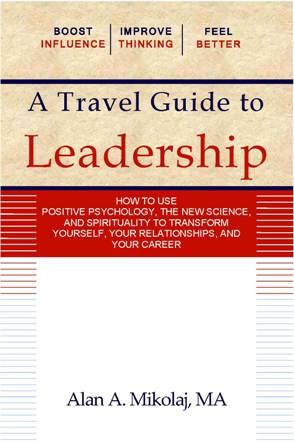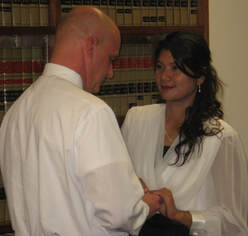|
As we get ready to plunge into these next three weeks that include Hanukkah, the Winter Solstice, Kwanzaa, Christmas, Boxing Day, end of the fiscal year for many, and New Year's (am I missing something?), it may be helpful for us to pause for a moment and gain some perspective on the holidays and think about integrating a few strategies from psychology that just might help us more fully enjoy and respond to what the season brings—and maybe even avoid a disaster. So, I'm going to share three strategies and take-aways from psychology that you can integrate into your game plan going into the holidays. To get us started, I want to share a true story. A true story It all started a few months ago. My wife began telling me about what she wants for Christmas and our anniversary.
"A ring? Really? What about your wedding ring?" I sheepishly asked. She wanted a ring. A special ring. Okay. Clear expectations. This should be easy—or so I thought. Fast forward to about two weeks ago. I finally launched my 'special ring' search. I didn't get very far. I stopped about 20-minutes in. It's been awhile since I've shopped for a ring of this magnitude—fifteen years to be exact. What I was clear on, was that this anniversary was very special for her and that this ring had to be special to match. She was very clear about that. When I looked at the search results, the range on the styles seemed endless. Does she want gaudy, simple, or somewhere in-between? Does she want a real diamond or is Zirconia okay? Does she even want a diamond. Maybe a ruby? Red is her favorite color. Or maybe a band, or something else? Does it have to come from a jeweler or is JTV or Amazon okay? I needed more clarity. "Hun? Can you come in here and at least help me narrow down what kind or style of ring you want?" I asked. "I'm not asking you to tell me the exact ring you want, unless you really want to. But, if you can help me at least narrow it down to what kind of ring or style you're imagining, it would really help." It's a good thing I asked. I would have totally missed the mark of what type and style of ring she actually wanted and expected and she probably would have been disappointed. She clarified that she wanted something simple and we then clarified a few other specifics. And she pointed to a few rings that she liked. I thanked her and told her I'd do an extensive search and find something I thought met her expectations and would still pleasantly surprise her. We'll find out how I did on Christmas morning. If she hadn't first told me what she wanted and I hadn't asked for clarity and she hadn't given it, well... who knows what might have happened? I found out after clarifying with her that the rings that were catching my attention at first, were way off-base from what caught hers. And, that's the whole point of our first strategy: Check your expectations—and that includes communicating them and asking for clarity, even when you think you have it. STRATEGY #1: Check your expectations. Are expectations good or bad? "Yes," says Mel Schwartz, a psychotherapist, marriage counselor, TEDx speaker, and author. "They are neither and they are both. They are what me make them and what we make of them." While healthy expectations are necessary for normal functioning, growth, and thriving, they can also be unhealthy or what psychologists calls unrealistic expectations. Those can get us into real trouble, especially around the holidays. Problems with expectations can emerge when we expect something to happen without good reasons for them and/or not communicating them clearly or at all. Disappointment Expecting life to always turn out just the way you want is a guarantee for disappointment, especially around the holidays. Why? Reality check! Because life—and the holidays—will not always turn out exactly the way you want them to. So, evaluate your expectations. Are they realistic? Are they clear? Did you communicate them clearly? Did you ask for clarity of others' expectations? Resentment And when those unfulfilled expectations involve the failure of other people to behave the way you expected them to, your disappointment can also lead to resentment. And then there's the impact on them. If your expectations weren't clear or weren't verbalized at all, that intensifies any resentment. This is part of what we call the implicit social contract. We just assume that everyone in our lives knows what is expected or wanted and we all walk around with this internal, unspoken, unclarified deal lurking in the background just ripe for violation. Without actually verbalizing and clarifying expectations about give-and-take in a relationship, about events, meals, how people should and should not behave, gifts and gift-giving—the list is endless—without this communication, people create stories in their heads about what is and what is not legitimate expectations of each other. It's hard for someone to live up to your expectations if they don't know what they are. Believing that an unverbalized expectation will bring you what you want is magical thinking, unrealistic, and sets you and others up for disappointment and resentment. Some solutions Consider letting go of, revising, communicating, and/or clarifying some of your key holiday expectations. In his article, Unrealistic Expectations Impede Happiness and Empathy, Mark B. Baer quotes Dennis Prager as saying: Because gratitude is the key to happiness, anything that undermines gratitude must undermine happiness. And nothing undermines gratitude as much as expectations. There is an inverse relationship between expectations and gratitude: The more expectations you have, the less gratitude you will have. Expectations that serve you and others are healthy. Those that don't , aren't. Ask for clarity, even if you think you have it. Remember my opening story. Clear, or even better, more clear expectations avoid resentment and disappointment and enhance experiences. Healthy and clear expectations help you and others grow together, experience greater intimacy, and experience life more fully—and fill the holidays with greater joy, to boot. Keep a check on your own expectations and clearly communicate key expectations as you go through the next few weeks. Clarify expectations. If you don't know or aren't clear, ask. Oh, and all of this applies to your leadership and work environment, too. STRATEGY #2: Remember the experiential advantage. I wrote about this strategy a couple of week's ago in my blog: Oh, What to Buy for Christmas? It's got some great lessons on this. In a nutshell, purchased experiences (versus things), especially those that include meaningful, positive conversations with loved-ones tend to bring more and longer-lasting happiness, memories, and consumer satisfaction. So, think about including an experience, like a trip or a dinner out, as part of your holiday gift purchases. Create your own experiences. Making time to relax, have fun, and enjoy moments with those you love (with clear, verbalized expectations, of course!) is a way to take advantage of the experiential advantage. The more they can include meaningful conversations, the greater the impact. And they can be low-cost or free. STRATEGY #3: It's okay to set boundaries. While experiences are good, you don't have to do everything, go to every event, and get and give everything on your list or theirs (see Strategy #1 on expectations above). And, you don't have to interact with everyone. There may be people (including family) that it's just not such a good idea to see and interact with this holiday season—for some that may include psychological and even physical safety issues. Increase meaningful conversations & reduce difficult ones Remember, it's the meaningful, positive, conversations that make the difference. It's important to take care of yourself and those you love during the holidays—and setting healthy boundaries can help cut down on the rush and stress. Boundaries can also reduce the possible inappropriate timing of and the inappropriate place for a difficult conversation. That can reduce conflicts. Think about saving those for after the holidays and not at a family gathering or the office holiday party. You may not be able to avoid that person entirely, but you can express your boundaries, when needed, and then limit the interaction. How do you set boundaries? When setting boundaries, get clear and communicate them calmly. Be ready to articulate them and why you set them. Be ready to negotiate and compromise, when appropriate. If your boundaries need to be firm, stick by them. It's okay to have a time-out during the holidays and pickup on difficult conversations when it may be more appropriate. If you want to learn more about setting and enforcing healthy boundaries, I recommend one article from Positive Psychology.com and two short articles from Psychology Today:
Setting, appropriate, healthy boundaries can help make your holidays more merry and joyful. There's so much more. There are all kinds of other strategies from psychology, like nurturing gratitude and the positive psychology of giving and kindness, which are such a central part of the holidays. But alas, Santa's got a long list and some expectations that he's gotta check—and he's gotta check 'em twice. Until next week... Have an amazing journey! Alan Mikolaj is a coach and leadership development consultant with 15+ years of experience. He is passionate about helping leaders transform their leadership, their teams, and their organizations. Impactful, professional approach driven by a passion for meaning and purpose, a growth mindset, and a commitment to excellence and service in order to drive change and results.
Alan maintains the ethics and standards of behavior established by the International Coaching Federation (ICF), including the standards regarding confidentiality. You can learn more about them on the ICF website.
0 Comments
Leave a Reply. |
Alan Mikolaj
Alan Mikolaj is a a professional, experienced, positive, and passionate speaker, leadership and organizational development consultant, change agent, author, and coach. He holds his Master of Arts degree in Clinical Psychology from Sam Houston State University. He is a certified graduate coach from Coaching Out of the Box and holds his ACC and membership with the International Coaching Federation (ICF). Free Discovery Conversation!
Impactful change starts with a conversation! Schedule your free, one-hour session by clicking here: Discovery Conversation with Alan
Or call or email: Contact Page In his third book, A Travel Guide to Leadership, Alan offers you simple, fundamental, and powerful lessons that have the power to transform you, your relationships, and your career.

Blog Archives
July 2024

Linked2Leadership
Ranked #1 Business Blog! |
|
CONTACT
TEL: 346-291-0216 EMAIL: [email protected] SCHEDULE TIME WITH ALAN Free Discovery Conversation with Alan |











